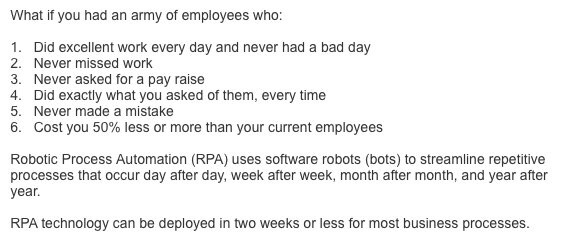
Are Robots a Way to Avoid Critical Business Questions?

You’d have to live in a cave without access to power, TV or the internet to avoid the recent flood of headlines about replacing working people with AI driven robots.
But you know what’s missing from the robot discussion? It’s summed up in this line from W. Edwards Deming’s “Out of the Crisis” (p. 53 in my edition):
“The greatest waste in America is failure to use the abilities of people”.
There are some very good ways robots can be used in business although many of the hyped ideas are bad ways to use them. (As retail associates? Really?)
But the tremendous crime today is there’s little insightful discussion of the significant value people bring to their jobs that robots never will.
So consider the groundwork managers get from business school or standard management training. Essentially, business has never responded to Deming’s challenge:
-
Managers at all levels are pressured to produce reliable results even though it’s entirely likely that placing reliable results above all other outcomes might have a negative impact on the total business. Still, businesses everywhere prefer predictability to discovery; reliable results to opportunity for dramatic improvements.
-
In trying to achieve these results, many managers attempt to be “masters of the universe” pulling levers, changing metrics, setting metric based goals, and driving those goals down from the top – remaining ignorant of the abilities of people.
-
So for many managers, nothing is less predictable than the people that work for them – especially if those people are 2, 3 or more levels below them.
-
In fact, countless hours of business school time are dedicated to creating metrics and processes assuming they can remove human tendencies from the work environment.
-
Many more hours are spent analyzing business as if it’s success didn’t depend entirely on humans to design, make, sell, or buy products and services.
-
Rather than reward managers for brilliance that comes through employees, the “punish because your employees did it” culture is dominant in American business.
-
Leveraging the value of individuals requires risk – yet what Deming knew and what I’ve found is that the vast majority of the time individuals take responsibility that is wisely given and deliver beyond your highest expectations.
In fact, here is the body of a SPAM email I received in May 2018.

So the theory of AI driven robots and “machine learning” has fallen onto fertile ground and higher level managers are choosing to believe that maybe, finally, robots will take human foibles out of the equation while ignoring that they will remove human brilliance at the same time.
- Have robot enthusiasts stopped to consider the unique version of hell they are creating for themselves? What will frustrate upper level management more than the unreliability of people? Legacy software in robots where making a single small change costs millions and takes years.
- How long before the fresh, new robots working in the factory become out of date, impossible to control robots destroying business?
- And God forbid they would heed the value the human individual brings to work. That an empowered retail clerk can deliver far, far, far more satisfaction than a robot ever could. That only humans can have leaps of insight. That only humanity brings what’s critical for success – and not just at the executive level but on the assembly line.
- I need note there is no competitive advantage in leveraging robots – or nothing more than a short-term advantage. Very quickly all your competitors will have them as well.
- All this meaning: The only true competitive advantages are those people deliver for you.
Is there any more dramatic way to waste the abilities of people than to take them completely out of the work force – to eliminate the potential for excellence that Americans can bring to business?
Businesses must always be aware that the instinct for robots is quite often also the instinct to give up excellence in return for total control. The only way to rise to excellence is to take risks – risks that include the potential for failure. To do anything else is to ensure your business can do no more than mediocrity.
Of course I’m presenting a narrow view in the process of theorizing. I do that to draw attention to the discussion.
But unfortunately, I don’t think I’m exaggerating too much. Recent history of digital efforts shows that shiny baubles that claim to eliminate risk are adopted quickly even if, in doing so, they entrench mediocrity.
Even worse, over the course of my career, it seems the bulk of corporations have lost any sense that they owe their employees loyalty. Instead, they publicly discuss replacing them all with robots and AI.
Today we need to return to Deming and search, in a parallel discussion, for ways to better use the abilities of people who already dedicate a major portion of their lives to our businesses.
Copyright 2018 – Doug Garnett – All Rights Reserved
Categories: Big Data and Technology, Business and Strategy
